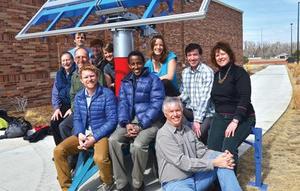Public healthInnovative solar-powered toilet to be unveiled in India next week
Unsafe methods to capture and treat human waste result in serious health problems and death — food and water tainted with pathogens from fecal matter results in the deaths of roughly 700,000 children each year. A revolutionary toilet fueled by the sun is being developed by University of Colorado Boulder researchers to help some of the 2.5 billion people around the world lacking safe and sustainable sanitation. It will be unveiled in India this month.

The UC engineering team that designed the solar powered toilet // Source: colorado.edu
A revolutionary University of Colorado Boulder toilet fueled by the sun that is being developed to help some of the 2.5 billion people around the world lacking safe and sustainable sanitation will be unveiled in India this month.
The self-contained, waterless toilet, designed and built using a $777,000 grant from the Bill & Melinda Gates Foundation, has the capability of heating human waste to a high enough temperature to sterilize human waste and create biochar, a highly porous charcoal, said project principal investigator Karl Linden, professor of environmental engineering. The biochar has a one-two punch in that it can be used to both increase crop yields and sequester carbon dioxide, a greenhouse gas.
A CU-Boulder release reports that the project is part of the Gates Foundation’s Reinvent the Toilet Challenge, an effort to develop a next-generation toilet that can be used to disinfect liquid and solid waste while generating useful end products, both in developing and developed nations, said Linden. Since the 2012 grant, Linden and his CU-Boulder team have received an additional $1 million from the Gates Foundation for the project, which includes a team of more than a dozen faculty, research professionals and students, many working full time on the effort.
According to the Gates Foundation, the awards recognize researchers who are developing ways to manage human waste that will help improve the health and lives of people around the world.
Unsafe methods to capture and treat human waste result in serious health problems and death — food and water tainted with pathogens from fecal matter results in the deaths of roughly 700,000 children each year.
Linden’s team is one of sixteen around the world funded by the Gates Reinvent the Toilet Challenge since 2011. All have shipped their inventions to Delhi, where they will be on display 20-22 March for scientists, engineers and dignitaries. Other institutional winners of the grants range from Caltech to Delft University of Technology in the Netherlands and the National University of Singapore.
The CU-Boulder invention consists of eight parabolic mirrors that focus concentrated sunlight to a spot no larger than a postage stamp on a quartz-glass rod connected to eight bundles of fiber-optic cables, each consisting of thousands of intertwined, fused fibers, said Linden. The energy generated by the sun and transferred to the fiber-optic cable system — similar in some ways to a data transmission line — can heat up the reaction chamber to
